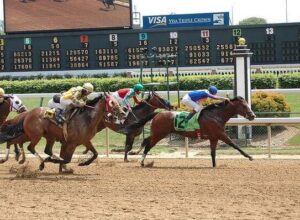 Horse racing, a long-standing tradition, has etched itself deeply into the cultural identity of Kentucky. In this region, this sport goes far beyond a mere pastime—it’s a historical legacy. The strong tie between the state of Kentucky and horse racing is deep-seated, dating back centuries.
Horse racing, a long-standing tradition, has etched itself deeply into the cultural identity of Kentucky. In this region, this sport goes far beyond a mere pastime—it’s a historical legacy. The strong tie between the state of Kentucky and horse racing is deep-seated, dating back centuries.
The Roots of the Tradition
Horse racing in Kentucky is believed to have been introduced by settlers from the East Coast. Kentucky’s fertile landscape proved conducive for horse breeding, nurturing this newfound pastime.
Breeding Success
Over time, Kentucky started producing high-quality horses, and its reputation started growing. The state’s unique limestone-rich soil was found to be ideal for the development of strong, resilient horses. Kentucky’s grasses, nourished by this special soil, were discovered to impart exceptional strength and endurance to the horses that grazed on them.
The Establishment of Racetracks
As the quality of Kentucky’s horses improved, horse racing began to gain a firm footing within the state. Racetracks began to emerge, transforming the landscape and fostering a culture that would endure for generations. The first formal racetrack, known as “Louisville Jockey Club”, was established in 1875, later renowned as Churchill Downs.
Churchill Downs and The Kentucky Derby
Churchill Downs has since been home to the Kentucky Derby, one of the most prestigious horse races in the United States. This illustrious event, a part of the American Triple Crown, marks the beginning of the racing season and has been a constant in the state’s racing calendar.
Betting on Horse Races
As horse racing gained prominence, so did the culture of betting on races. This aspect of the sport has evolved significantly over time, adapting to the changing regulatory and technological environment. Today, betting is an integral part of the horse racing culture in Kentucky, contributing significantly to the sport’s economic impact in the state.
For instance, FanDuel Kentucky is a well-known platform providing sports betting services to the residents of Kentucky. This platform facilitates betting on horse races, among other sports, enabling enthusiasts to engage with the sport in a modern way.
Influence on the Local Economy
The prominence of horse racing has a profound impact on Kentucky’s local economy. The industry generates jobs, contributes to tourism, and boosts local businesses. From the breeding farms to the racetracks and beyond, the ripple effect is far-reaching.
The Era of Legends
Over the decades, Kentucky’s horse racing scene has been graced by some true legends, horses and jockeys alike. Their stories, marked by determination and exceptional skill, add to the rich narrative of the sport’s history.
Influential Jockeys and Horses
Names like Bill Hartack, Eddie Arcaro, and Pat Day have left their indelible mark on the annals of Kentucky’s horse racing. These jockeys, with their exceptional talent and unwavering determination, set records and etched their names into the sport’s history.
Alongside these great jockeys, legendary horses, too, emerged from Kentucky. Names such as Secretariat, a horse with a heart almost twice the average size, and Man o’ War, often hailed as one of the greatest racehorses in American history, were bred on the fertile lands of Kentucky.
The Changing Landscape of Horse Racing
While Kentucky’s horse racing industry has a storied past, it has also evolved over time to embrace changes and stay relevant in the modern era. New technologies and changing societal norms have influenced various aspects of the sport.
Technology and Horse Racing
In the current era, technology has touched every aspect of life, and horse racing is no exception. Technologies such as digital platforms for betting and advanced tracking systems for horse training have been incorporated into the industry, enhancing the sport and enabling it to adapt to changing times.
Philanthropy and Horse Racing
Kentucky’s horse racing industry has not just been about competition and financial gain; it has also significantly contributed to society through various philanthropic efforts.
The Role of Philanthropy
Many racehorse owners, jockeys, and racing enthusiasts have used their resources and influence to give back to the community. They’ve supported causes like education, healthcare, and animal welfare, further enhancing the positive impact of the industry on the state.
Final Thoughts
In summation, the history of horse racing in Kentucky is a rich and multifaceted narrative, blending a deep-rooted tradition with modern advancements. It’s a story of superior breeding, legendary races, and remarkable figures—both human and equine—that have shaped this enduring legacy. As the industry continues to evolve, it remains anchored in its past, honoring the traditions and legends that have made it what it is today. The future of horse racing in Kentucky looks bright, promising new chapters in this fascinating historical journey.